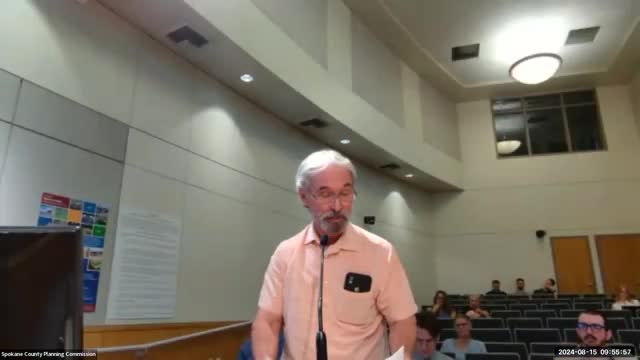Concerns rise over wind power's impact on Snake River dams
August 20, 2024 | Spokane County, Washington
This article was created by AI summarizing key points discussed. AI makes mistakes, so for full details and context, please refer to the video of the full meeting. Please report any errors so we can fix them. Report an error »

During a recent government meeting, significant concerns were raised regarding the potential impact of renewable energy policies on the Snake River dams and the region's hydropower production. A key speaker highlighted that current policies prioritize wind and solar energy over hydropower, particularly during the spring when both wind and water resources peak. This shift could lead to a scenario where the dams, despite their capacity to generate power, may not be utilized effectively, raising fears that they could be deemed less essential.
The speaker emphasized that the Bonneville Power Administration is mandated to prioritize wind energy on the national grid, which could undermine the operational viability of the Snake River dams. This situation could result in a perception that the dams are not generating power, despite their critical role in providing immediate and reliable energy, especially during emergencies.
Concerns were echoed by representatives from various power companies, who noted that while the demand for energy is increasing, the reliance on wind energy—often subsidized by the government—could jeopardize the established benefits of hydropower. The speaker pointed out that hydropower not only supplies electricity but also supports irrigation and local economies, particularly in energy-intensive industries that have flourished due to the availability of affordable power.
The discussion underscored the importance of maintaining a balanced energy strategy that recognizes the value of hydropower, which accounts for over 75% of inland power generation. The speaker cautioned that any drastic policy changes favoring renewable sources could lead to significant energy shortages and economic repercussions for the region.
The speaker emphasized that the Bonneville Power Administration is mandated to prioritize wind energy on the national grid, which could undermine the operational viability of the Snake River dams. This situation could result in a perception that the dams are not generating power, despite their critical role in providing immediate and reliable energy, especially during emergencies.
Concerns were echoed by representatives from various power companies, who noted that while the demand for energy is increasing, the reliance on wind energy—often subsidized by the government—could jeopardize the established benefits of hydropower. The speaker pointed out that hydropower not only supplies electricity but also supports irrigation and local economies, particularly in energy-intensive industries that have flourished due to the availability of affordable power.
The discussion underscored the importance of maintaining a balanced energy strategy that recognizes the value of hydropower, which accounts for over 75% of inland power generation. The speaker cautioned that any drastic policy changes favoring renewable sources could lead to significant energy shortages and economic repercussions for the region.
View full meeting
This article is based on a recent meeting—watch the full video and explore the complete transcript for deeper insights into the discussion.
View full meeting
